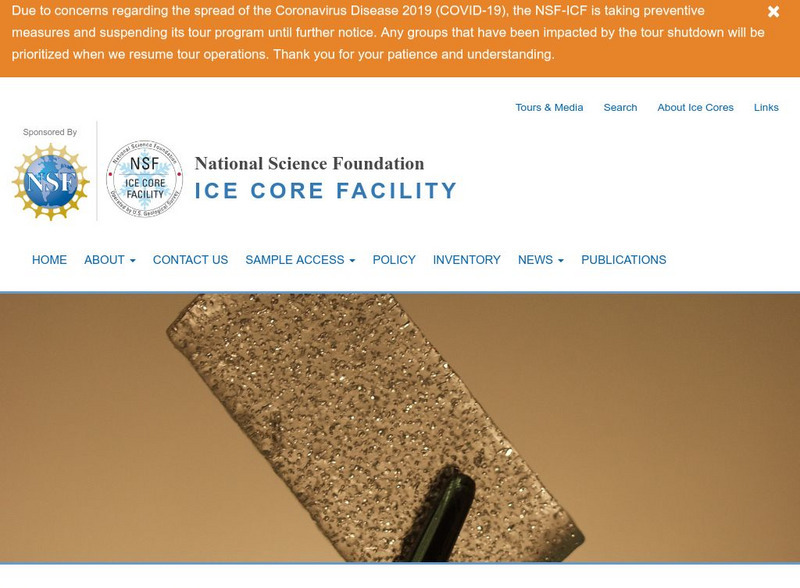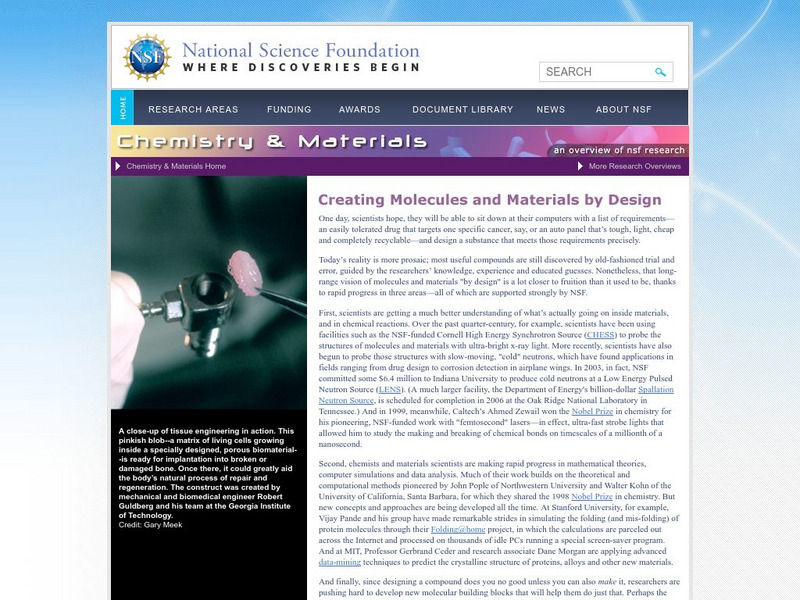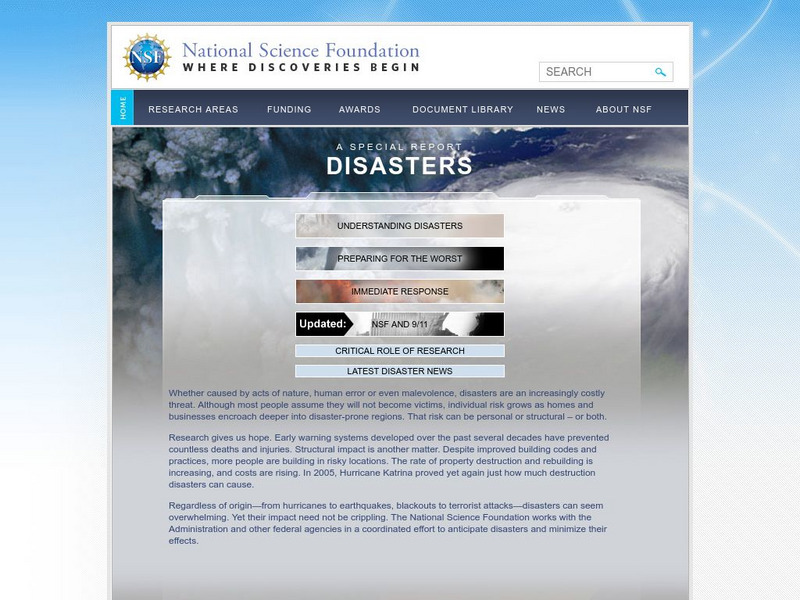National Science Foundation
National Science Foundation: Arctic & Antarctic
The National Science Foundation has conducted extensive research on this region that is often thought of as barren and devoid of all scientific promise. Learn more about these frigid regions and what is being done to understand more...
National Science Foundation
National Science Foundation: Astronomy and Space: Research Overview
Explore some of our most fundamental questions about space exploration with this research overview collected by scientists at the National Science Foundation. Additionally, experience deep space first-hand with telescope interactives.
National Science Foundation
National Science Foundation: The Birth of the Internet
This visually engaging feature by the National Science Foundation provides an excellent explanation of how the internet came to be and those responsible for it's inception. Many original computers and other instruments are discussed and...
National Science Foundation
National Science Foundation: A Tour of the Cell
Imagine having a microscopic camera so small that you could travel inside a cell. This interactive site allows you to do just that. Click on any one of eight individual parts of the cell--cell membrane, nucleus, DNA, RNA, ribosome,...
National Science Foundation
National Science Foundation: Language and Linguistics
The language we use everyday reveals a great deal about who we are and where we come from. However, did you know that language is linked to psychology, biology, and other sciences? Explore the "science" of language: how the brain...
National Science Foundation
National Science Foundation: Extreme Microbes
The resource explores the National Science Foundation's special report on extreme microbes. Some topics included are radiation eaters and amazing survivors. The interactive activity consists of a video tours, illustrations, related...
National Science Foundation
National Science Foundation: Engineering: Research Overview
A description of engineering research that is currently being performed through NSF funding. Students can learn how engineers improve health, strengthen the economy and many more topics.
National Science Foundation
National Science Foundation
This is the official website of the National Science Foundation (NSF), an independent federal agency that promotes the progress of science. The site often features the latest information on such issues as climate research, wildlife...
National Science Foundation
National Science Foundation: u.s. South Pole Station
The resource explores the National Science Foundation's Amundsen-Scott South Pole Station. The interactive activity consists of a video tour, illustrations, related resources, and a webcam.
National Science Foundation
National Science Foundation: Find Funding
An A to Z listing of grants offered for research in science, math, and engineering.
National Science Foundation
National Science Foundation: Arctic and Antarctic: An Overview of Nsf Research
How did the universe begin? Is the global climate changing? These ever present questions are addressed in this comprehensive site by the National Science Foundation. A link to an interactive feature is also available that details how the...
National Science Foundation
National Science Foundation: Science of Summer Olympics
Using examples of athletes and sports involved in the 2012 Summer Olympics, these 9 videos demonstrate aspects of sports which are influenced by engineering and technology.
National Science Foundation
National Science Foundation: The Science of the Olympic Winter Games
A 16-part video series from the partnership of NBC and the National Science Foundation, on the "physics, biology, chemistry, and materials engineering behind the Olympic Winter Games." Exciting and engaging videos give new meaning to...
National Science Foundation
National Science Foundation: Ice Core Facility (Nsf Icf): About Ice Cores
A fantastic resource for learning about how ice cores are collected, the information we can learn from them about Earth's climate history, the types of research being done with them, and how they are stored. Includes lots of videos.
National Science Foundation
National Science Foundation: Chemistry & Materials: Creating Molecules and Materials by Design
Describes the progress being made in materials engineering, so that one day in the not too distant future scientists will easily be able to use a computer to design materials that meet any required properties.
National Science Foundation
National Science Foundation: State Support for Higher Education Per Full Time Equivalent Student
The interactive map on this page displays the amount spent by each states on public universities, excluding special purpose appropriations. The statistics are searchable by state for each year between 2000 and 2020. Data is also...
National Science Foundation
National Science Foundation: Disasters
The National Science Foundation provides us with a comprehensive report on disasters; understanding them, how to prepare for them, responding to them, and the latest news. Learn about the risks involved and how to minimize the effects.
National Science Foundation
National Science Foundation: Blond Fur Seal
This blond fur seal, a rare color morph, was spotted in the region near Palmer Station along the Antarctic Peninsula in March 2013.
National Science Foundation
National Science Foundation: Fluorescent Coral
Justin Marshall researches fish and invertebrate color vision, color communication, and visual ecology of coral reefs and other habitats. He photographed this fluorescent coral under fluorescent lighting conditions
National Science Foundation
National Science Foundation: Polar Bear Ancestry Traced to Ireland
See five close-up images of polar bears as part of a study of the relationship between bear ancestry and historical climate change.
National Science Foundation
National Science Foundation: Supercomputer Gordon
Located at the San Diego Supercomputer Center, Gordon is a completely new kind of supercomputer that uses massive amounts of flash memory to retrieve randomly organized data.
National Science Foundation
National Science Foundation: Star Makes Closest Approach to Black Hole in Milky Way
A star known as S0-2 made its closest approach to the supermassive black hole at the center of the Milky Way in 2018.
National Science Foundation
National Science Foundation: Optogenetics
In this full-color image, a neuron is expressing the light-gated cation channel channelrhodopsin-2 (small green shapes), and is being illuminated by a focused beam of blue light (coming from the top).
National Science Foundation
National Science Foundation: 3 D Simulation of Exploding Supernovae
A 3-D representation of six exploding supernovae made by powerful supercomputers that allowed various multidimensional instabilities to be expressed.
















